|
|
|
Sort Order |
|
|
|
Items / Page
|
|
|
|
|
|
|
| Srl | Item |
| 1 |
ID:
104998
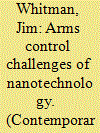

|
|
|
|
|
| Publication |
2011.
|
| Summary/Abstract |
The military potential of nanotechnology was anticipated by its proponents from the early stages of its development, and explicit programmes for this purpose are now well established. However, the impact of nanotechnology on arms control is very unlikely to be merely additive. Instead, it threatens to undermine the arms control paradigm, for reasons explored in this paper. These include the place of nanoscience and nanotechnology as the principal enablers of technological convergence; the extension from dual-use to multiple-use dilemmas arising from new materials and processes, and their integration into economic development and competitiveness; low entry-level infrastructural requirements (already a feature of biotechnology); and a blurring of the distinction between offensive arms and capabilities likely to be viewed as threatening.
|
|
|
|
|
|
|
|
|
|
|
|
|
|
|
|
| 2 |
ID:
104990
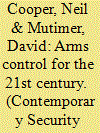

|
|
|
|
|
| Publication |
2011.
|
| Summary/Abstract |
In the past two decades there has been an extensive reconceptualization of security and its associated practices, but there has been scant attention to questions of arms and their control. This article, and those which follow, seek to start a conversation about the control of the means of violence. We begin by drawing on the metaphor of arms control as science fiction in order to highlight notable features of the classical arms control literature. The article then discusses the ways contemporary arms control practice has evolved from a Cold War focus on parity and mutual vulnerability to a global control architecture characterized by the pursuit of absolute security via an ever-expanding range of non-proliferation initiatives aimed at rogues, rebels and terrorists. Consequently, in its post-Cold War, post-9/11 mode, contemporary arms control practice has been transformed into a form of global counter-insurgency. We suggest that the term controlling the means of violence (CMV) better captures the wide range of control initiatives that can be deployed to limit the instruments of armed violence. Finally, we summarize the arguments set out in the rest of the special issue and outline the future directions for research and activism suggested both by the papers collected in this volume and the broader discussions in the conferences that gave rise to them.
|
|
|
|
|
|
|
|
|
|
|
|
|
|
|
|
| 3 |
ID:
105000
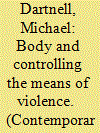

|
|
|
|
|
| Publication |
2011.
|
| Summary/Abstract |
his research on suicide terrorism and arms control focuses on use of the human body as a weapon and the intersection of the body with technology. Through the case of the French terrorist group Action directe (Direct Action) the article analyzes the impact of suicide terrorism on conventional terrorists, the possibility that conventional terrorists become more violent when another group with similar or identical goals turns to suicide terrorism, and asks whether conventional terrorists turn to suicide terrorism once an example is set by another group. The article concludes that contemporary suicide fosters a perception of strength and of the vulnerability of conventional forces. In this light, suicide terrorism and the role that the body plays with an exploding prosthetic, are a major new challenge to how arms control is analyzed and discussed.
|
|
|
|
|
|
|
|
|
|
|
|
|
|
|
|
| 4 |
ID:
105007
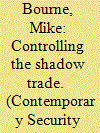

|
|
|
|
|
| Publication |
2011.
|
| Summary/Abstract |
From tackling illicit flows of small arms to combating nuclear smuggling, the shadow trade has become a central target of attempts to control the means of violence. This article argues that much of this practice and literature is framed in unhelpful terms that posit two distinct worlds, an upperworld and underworld, that separates illicit flow networks from the familiar world of state security policy. This implies that the possibilities for controlling the shadow trade are limited or require expansive and expensive controls. The article then examines the formation of illicit flow networks, drawing on examples including narcotics, small arms, nuclear materials, nuclear technology, major conventional arms, dual use technologies, and chemical weapons precursors; and finds that state and hybrid actors rather than extensive private networks are constitutive of illicit networks in many ways. It concludes by reclaiming hope for controlling the means of violence in this hybridity.
|
|
|
|
|
|
|
|
|
|
|
|
|
|
|
|
| 5 |
ID:
104994
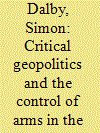

|
|
|
|
|
| Publication |
2011.
|
| Summary/Abstract |
Critical geopolitics is about challenging the taken for granted contextualizations of social phenomena on the large scale. Invoking insights from this burgeoning literature, this paper examines some of the key taken for granted geopolitical specifications in the discussion of arms control. In particular the case of the new Strategic Arms Reduction Treaty between the United States and Russia, and the persistent discourses of Iranian threat are formulated within some obvious, but very important geographical premises. The possibilities of innovations in the structure of the world order cannot ignore how desirable futures are rhetorically mapped, any more than they can avoid the question of who controls which arms where, in that order. Geography is never innocent, and the analysis in this paper suggests caution is appropriate when assuming the efficacy of particular contextualizations in both academic analysis and policy prescription.
|
|
|
|
|
|
|
|
|
|
|
|
|
|
|
|
| 6 |
ID:
105003
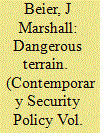

|
|
|
|
|
| Publication |
2011.
|
| Summary/Abstract |
The bases of legitimacy in recourse to war have, in recent years, come to turn vitally on meaningful discrimination between combatants and noncombatants. Concurrently, the remarkable successes of the movement to ban antipersonnel landmines and the follow-on ban on cluster munitions have likewise been predicated on this same arbiter of legitimacy, marking specific kinds of weapons as bad for their inherent indiscriminacy. This article begins by exploring sources of popular expectations that make official claims to discriminacy seem plausible. In particular, the role of popular representation is considered for its foregrounding of the technological feats of precision-guided munitions in ways that mystify ethico-political questions about their use. It is argued that this, more than any objective properties of weapons themselves, has been the truly revolutionary aspect of the so-called Revolution in Military Affairs (RMA). The implications of/in this for/by disarmament advocacy of the sort exemplified in the civil society campaign to ban landmines are weighed.
|
|
|
|
|
|
|
|
|
|
|
|
|
|
|
|
| 7 |
ID:
104995
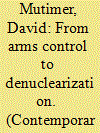

|
|
|
|
|
| Publication |
2011.
|
| Summary/Abstract |
On 5 April 2009, US President Barack Obama spoke in the Czech Republic, and the speech included the following quite extraordinary pledge: 'So today, I state clearly and with conviction America's commitment to seek the peace and security of a world without nuclear weapons.' Obama renewed the commitment the United States had first made formally by ratifying the Nuclear Non-Proliferation Treaty, to work towards nuclear disarmament, and went further to indicate that the means he would use to reach that goal, in the first instance, would be bilateral arms control negotiations. This article explores the relationship between the practice of negotiated, bilateral, nuclear arms control, and the goal Obama has so clearly set of reaching a world without nuclear weapons. It argues that arms control, understood as a social practice, is ill-suited to the pursuit of nuclear disarmament; that while arms control can produce limits and even reductions in nuclear weapons, it works against the overall elimination of arms. It then sets the practice of bilateral nuclear arms control in the context of the governmental rationality, or governmentality, elaborated by Michel Foucault to argue that nuclear arms control is a governmental technology, rooted much deeper than simply a Cold War diplomatic practice. From there, the article shows that the initial products of Obama's pledge, notably the New START Treaty are another instance of this governmental practice, before concluding with some thoughts on the way towards denuclearisation without passing through Cold War arms control.
|
|
|
|
|
|
|
|
|
|
|
|
|
|
|
|
| 8 |
ID:
105001
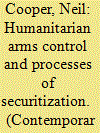

|
|
|
|
|
| Publication |
2011.
|
| Summary/Abstract |
This article undertakes a critical analysis of what have been labelled humanitarian arms control (HAC) initiatives, most notably, recent agreements to ban cluster munitions and landmines as well as efforts to restrict the proliferation of small arms. The article critiques conventional accounts that view such initiatives as illustrating the potential of global civil society to interject human security concerns into the domain of arms regulation through the exercise of bottom-up power. In order to do this, the article first outlines the concept of securitization, particularly Floyd's discussion of positive and negative forms of securitization and Abrahamson's concept of the security continuum. This is used to frame an analysis of contemporary HAC initiatives that locates them in the much longer history of pariah weapons regulation and the way it relates both to the framing of legitimized weapons and changes in the broader regulation of the conventional defence trade in different eras. In contrast to conventional accounts of the HAC agenda, it is argued that initiatives such as those on landmines and cluster munitions were successful precisely because they were consonant with the same discourse used to legitimize both post-Cold War liberal interventionism and the new generation modern high-tech weapons. Moreover, the extra-securitization of landmines, cluster munitions and small arms has been accompanied by the (relative) desecuritization of the trade in major conventional weapons and associated dual-use technologies, a process that has a number of quite negative effects in terms of arms trade regulation. The article concludes by reflecting on the implications of the preceding analysis both for thinking about processes of securitization and for arms trade non-governmental organizations (NGOs).
|
|
|
|
|
|
|
|
|
|
|
|
|
|
|
|
| 9 |
ID:
105004


|
|
|
| 10 |
ID:
104992
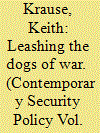

|
|
|
|
|
| Publication |
2011.
|
| Summary/Abstract |
The progressive development of measures to control weapons of mass destruction in the 1980s and 1990s moved arms control beyond a sovereign conception, towards a larger logic of governmentality that reaches deep into the domestic affairs of states and involved forms of regulation and control that went far beyond inter-state agreements to regulate their military competition. The article first focuses on the larger historical process of controlling arms, understood as a technology of social and political control designed to manage and channel the use of violence both within and between states. In this sense, the Cold War arms control paradigm represented both a shift in, and continuity with, historical arms control experiences. But by representing itself as a set of instrumentally-rational techniques for managing conflict, arms control throughout the Cold War normalized a particular set of practices as the only proper way of dealing with a subset of the larger issue of how to 'control and regulate the possession and use of the means of violence'. Many contemporary security-building practices that are not thought of as arms control share its same logic, but move towards a more governmental mode of exercising the control in arms control, focusing as much on institutions and individual wielders of violence as on the instruments of violence themselves.
|
|
|
|
|
|
|
|
|
|
|
|
|
|
|
|
| 11 |
ID:
105009
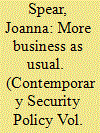

|
|
|
|
|
| Publication |
2011.
|
| Summary/Abstract |
his article examines the preparation of the US Nuclear Posture Review (NPR) by the Obama Administration. In doing so it seeks to answer a puzzle: why is there such a gap between the vision of a 'world free of nuclear weapons' set out by President Obama in his Prague speech of 2009 and the significantly more modest outcomes of the 2010 Nuclear Posture Review? The question is answered by employing the Bureaucratic Politics Paradigm developed by Graham Allison and Morton Halperin. It is argued that the answer lies in the fierce bureaucratic battles that are playing out within the administration, with both routine decision making and the outcomes of political games affecting the eventual NPR.
|
|
|
|
|
|
|
|
|
|
|
|
|
|
|
|
| 12 |
ID:
104997
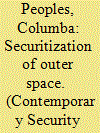

|
|
|
|
|
| Publication |
2011.
|
| Summary/Abstract |
The concepts of militarization and weaponization dominate debates on space security, and radically different implications for arms control follow depending on which of these two characterizations is adopted. Yet the militarization-weaponization debate in many ways fails to capture the vagaries of contemporary space policy. An increasing number of international actors now argue that the infrastructure of modern society - including communications, media, and environmental monitoring - is crucially reliant upon satellite technologies. As a result it is now more accurate to say that outer space is becoming ever more securitized: that is, access to space is now commonly framed as essential to the military, economic, and environmental security of leading states and international organizations. The article illustrates the contribution of a securitization approach in this regard via an analysis of United States and European Union space policy. In the process it argues that attempts at securitization in these space policy discourses maintain an inherent tension between global and national security concerns, and thus provide a weak basis for space arms control. However, in closing the article the author makes the argument that securitization of outer space, if configured around an alternate vision of space security that moves beyond the statist foundations of traditional arms control, can potentially mobilize the political will required for controlling the means of violence in and from outer space.
|
|
|
|
|
|
|
|
|
|
|
|
|
|
|
|
| 13 |
ID:
105006


|
|
|
|
|
| Publication |
2011.
|
| Summary/Abstract |
Small arms feature prominently on the post-Cold War international security agenda as the common factor in a range of forms of organized violence. The dominant mode of understanding is focused on human security and the links between conflict, security and development. Yet small arms control efforts are failing to live up to their promise. In attempting to remedy this, scholars argue that small arms control requires better conceptualization and operationalization. This article engages with the conceptualization of small arms control, arguing that small arms control serves to reproduce imperial relations in a number of ways. It is characterized by four key analytical themes - the blurring of the distinction between state, non-state and civilian actors; the increasingly fuzzy line between conflict and crime; the pacific nature of development; and the desirability of a Weberian monopoly on violence - that are derived from an idealized reading of the European historical experience and applied to the contemporary South. This conceptual Eurocentrism is furthered by the exclusion of wider questions of the world military order and militarism through a geographical and technological selectivity and the absence of a single analytical frame, as well as North-South hierarchies in the institutional formation of policymaking. Overall, small arms control serves to reproduce the South as a site of benevolent Northern intervention, contributing to the mutual constitution of both.
|
|
|
|
|
|
|
|
|
|
|
|
|
|
|
|
|
|
|
|
|